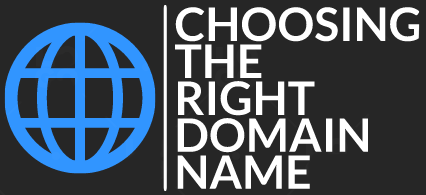Choosing the right domain name for your website is a crucial step in building an online presence. It is the first thing your potential visitors will see and remember about your website. Therefore, it is important to carefully consider your options and choose a domain name that accurately represents your brand, is easy to remember, and is easy to type.
In this article, we will discuss the factors that you should consider when choosing a domain name and provide you with some tips on how to choose the right one.
- Brand Identity:
Your domain name should reflect your brand identity. Your brand is what sets you apart from your competitors, and your domain name is the first thing your visitors will see when they come to your website. Therefore, it is essential to choose a domain name that accurately represents your brand.
For example, if your brand is all about providing eco-friendly products, then you may want to consider a domain name that reflects that, such as GreenProducts.com.
- Easy to Remember:
Your domain name should be easy to remember. A complicated domain name that is difficult to spell or pronounce can be a hindrance to your website’s success. Visitors are more likely to remember your website’s name if it is simple, easy to pronounce, and easy to spell.
For instance, Amazon.com is a simple and easy-to-remember domain name that has helped the company establish a strong online presence.
- Easy to Type:
Your domain name should be easy to type. If your domain name is difficult to type, it can lead to mistakes when entering the name in the browser, which can lead to lost traffic.
Therefore, it is important to avoid using special characters, numbers, or hyphens in your domain name. Instead, choose a simple and easy-to-type domain name that is easy to remember and easy to spell.
- Keyword Inclusion:
Including keywords in your domain name can help your overall SEO and rank better in search engine results pages (SERPs). However, it is important to not overdo it. Keyword stuffing in your domain name can result in penalties from search engines and negatively impact your search engine rankings.
For example, if your website sells handmade jewelry, you may want to consider including the keyword “handmade jewelry” in your domain name.
- Length:
Your domain name should be short and concise. Short domain names are easier to remember and type, and they look more professional.
A good rule of thumb is to keep your domain name under 15 characters. However, if you must use a longer domain name, make sure that it is easy to remember and easy to type.
- Extension:
There are many different domain extensions available, such as .com, .org, .net, and many others. The most popular and widely recognized domain extension is .com.
If you are planning to build a website for a business or an organization, it is recommended to choose a .com domain extension. If you are planning to build a website for a specific country, you may want to consider using a country-specific domain extension, such as .co.uk for the United Kingdom or .com.au for Australia.
- Avoid Copyright Infringement:
Before registering your domain name, it is important to make sure that it does not infringe on any existing trademarks or copyrights. You can check for existing trademarks using the United States Patent and Trademark Office (USPTO) website or other trademark search engines.
If you choose a domain name that infringes on an existing trademark or copyright, you may be forced to change your domain name, which can result in lost traffic and damage to your online reputation.
- Future Expansion:
When choosing a domain name, it is important to consider your future expansion plans. If you are planning to expand your business or services in the future, it is recommended to choose a domain name that is not too specific to your current niche or location. This will allow you to expand your business without having to change your domain name.
For example, if you own a bakery in New York City and plan to expand to other cities or states, choosing a domain name like NYCBakery.com may limit your ability to expand. Instead, choosing a more generic name like DeliciousTreats.com may give you more flexibility in the future.
- Availability:
Before finalizing your domain name, it is important to check its availability. The domain name you choose must be available for registration, or else you will have to choose a different name. You can use DataPacket’s domain name search tool to check the availability of your desired domain name.
If your desired domain name is already taken, you may want to consider using a different extension or adding a keyword to your domain name.
- Avoid Numbers and Hyphens:
It is important to avoid using numbers and hyphens in your domain name. These can make your domain name difficult to remember and can also make it look unprofessional. Visitors may also be confused about whether to spell out the numbers or use the actual numbers.
For example, if your domain name is 4MyWebsite.com, visitors may not know whether to spell out “four” or use the actual number “4”. Similarly, if your domain name is My-Website.com, visitors may forget to include the hyphen when typing your domain name.
Conclusion
Choosing the right domain name for your website is a critical step in building an online presence. A good domain name should accurately represent your brand, be easy to remember, easy to type, and short and concise. It is also important to avoid copyright infringement, choose the right extension, consider future expansion plans, and check for availability.
By following these tips, you can choose a domain name that will help you establish a strong online presence, improve your search engine rankings, and attract more visitors to your website.
